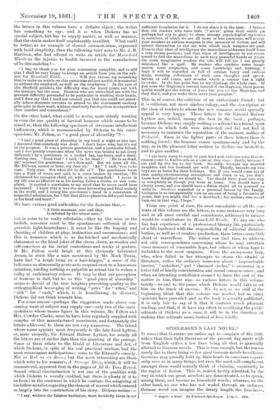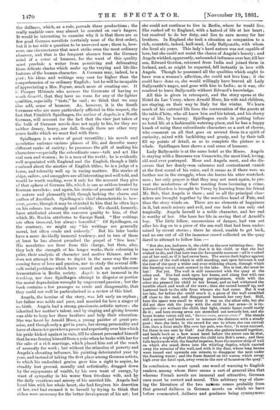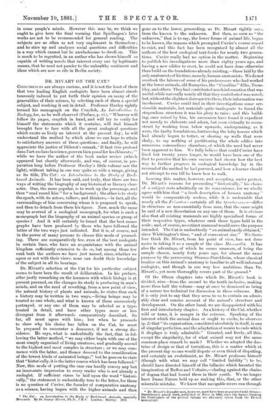SPIELHAGEN'S LAST NO VEL.*
Jr seems that Germans are rather apt to complain of the little notice that their light literature of the present day meets with from English critics, a few lines being all that is generally allotted to German novels. This is true enough, but the reason surely lies in there being so few good German novels to criticise. Germans may proudly hold up their heads in conscious superi- ority over us in many things, but even the most self-complacent amongst them would scarcely think of claiming superiority in the region of fiction. This is, indeed, tacitly admitted, by the way in which our great novelists are domesticated, so to speak, among them, and become as household words ; whereas, on the other hand, no one who has not waded through an ordinary German novel can imagine the dreary length, the heaviness,
• Angela: a Novel. By Friedrich Spielhagen. Leir:e. 1881.
the dullness, which, as a rule, pervade these productions ; the really readable ones may almost be counted on one's fingers. It would be interesting to examine why it is that there are so few good German novelists (certainly none of the first order), but it is too wide a question to be answered now; there is, how- ever, one circumstance that mast strike even the most ordinary observer, and that is the frequent absence from the German mind of a sense of humour, for the want of this quality must preclude a writer from perceiving and delineating those delicate shades which make up the varying and life-like features of the human character. A German may, indeed, be a poet ; his ideas and writings may soar far higher than the comprehension of us ordinary English ; but he will be incapable of appreciating a Mrs. Poyser, much more of creating one. It is Prosper Merlin& who accuses the Germans of having so much Gemiith, that they have no room for any of the lighter qualities, especially " taste," he said ; we think that we may also add, sense of humour. As, however, it is the South Germans who are more particularly afflicted iu this respect, the fact that Friedrich Spielhagen, the author of Angela, is a North German, will account for the fact that the view just taken of the bulk of German novels does not apply to his, for they are neither dreary, heavy, nor dull, though there are other very grave faults which we must find with them.
Spielhagen is a writer of great versatility ; his novels and novelettes embrace various phases of life, and describe many different ranks of society ; he possesses the gift of making his characters—especially the subordinate ones—talk and act like real men and women ; he is a man of the world ; he is evidently well acquainted with England and the English, though a little confused about the niceties of English titles; he is a judge of a horse, and tolerably well up in racing matters. His stories of ships, sailors, and smugglers are all interesting and well told, and would be worth reading, were it only for the account they give of that sphere of German life, which is one so seldom treated by German novelists ; and again, his stories of peasant life are true to nature and pleasantly told, though lacking the charm and pathos of Auerbach. Spielhagen's chief characteristic is, how- ever, power, though it may be objected to him that he often lays on his colours too strongly and crudely. We should, formerly, have attributed almost the converse quality to him, of that which Mr. Ruskin attributes to George Sand. "Her writings are often immoral, but always beautiful." Of Spielhagen, on the contrary, we might say " his writings are generally moral, but often crude and unlovely." But his later books have a more decidedly immoral tendency, and in two of them at least he has almost preached the gospel of "free love." His novelettes are freer from this charge, but then, also, they lack the strength of his longer works, their colouring is paler, their analysis of character and motive thinner, and he does not attempt in them to depict in the same way the con- suming force of love and passion, nor to study the several diffi- cult social problems which have caused such an unwholesome fermentation in Berlin society. Angel« is not immoral in its teaching, nor does Spielhagen attempt to disguise or poetise the moral degradation wrought by ungoverned passion ; but the book contains a few passages so crude and disagreeable, that they could not well be particularised in a review of this kind.
Angela, the heroine of the story, was left early an orphan ; her father was noble and poor, and married for love a singer of no birth. Angela had a strong, passionate, artistic nature ; she inherited her mother's talent, and by singing and giving lessons was able to keep her three brothers and help their education., She was loved by Arnold Moor, a young painter of great pro- mise, and though only a girl in years, her strong personality and force of character gave her a power and superiority over him which his pride kicked against in vain, till he almost persuaded himself that he was freeing himself from a yoke when he broke with her for the sake of a rich marriage, which placed him out of the reach of necessity for work ; but without the stimulus of poverty and Angela's elevating influence, his painting deteriorated year by year, and instead of taking the first place among German artists, to which his undoubted genius gave him a right to aspire, he steadily lost ground, morally and artistically, dragged down by the enjoyments of wealth, by his own want of energy, by want of sympathy in his worse than frivolous wife, and by the daily vexations and misery of his married life. Angela had loved him with her whole heart, she had forgiven his desertion of her, and had excused it to herself by trying to think that riches were necessary for the better development of his art; but she could not continue to live in Berlin, where he would live.
She rushed off to England, with a hatred of life at her heart ; but resolved to do her 'duty, and live to earn money for her brothers. In England she took a situation as companion to a rich, eccentric, indeed, half-mad, Lady Ballyeastle, with whom she lived six years. This lady's hard nature was not capable of love, but she could not resist the charm of Angela's beauty; and Angela wielded, apparently, unbounded influence over her, till her son, Edward Gordon, returned from India and joined them in Ireland, and, as might be expected, fell instantly in love with Angela Though he possessed all the qualities which ought to have won a woman's affection, she could not love him ; if she could have done so, she would willingly have braved all Lady Ballycastle's anger, and gone with him to India ; as it was, she resolved to leave Ballycastle without Edward's knowledge.
All this is given in retrospect, and the story opens at the Hotel du Lac Vevey, where Arnold Moor, his wife and children, are staying, on their way to Italy for the winter. We learn much of his outward life from the conversation of the guests at the table d'hOte, who all know him and his talent, and his showy way of life, by hearsay. Spielhagen excels in putting before us hotel life at a fashionable watering-place, and he has a happy knack of using these subordinate characters as a sort of chorus, who comment on all that goes on around them in a spirit of curiosity, mixed with backbiting and gossip, and by their talk fill up points of detail, so as to complete the picture as a whole. Spielhageu here shows a real sense of humour.
Lady Ballycastle is at the same hotel as the Moors. Angela is staying with a Baroness von Granewitz, the most kind, loving, old soul ever portrayed. Moor and Angela meet, and she dis- covers that her dearly-won calmness and contentment vanish at the first sound of his voice, and it seems as if there were no further use in the struggle, when she learns his utter wretched- ness ; her only prayer is that they may not meet again, to pre- vent the misfortune of their meeting from becoming a crime. Edward Gordon is brought to Vevey by learning from his friend Mr. Bob, that Angela is there ; and so all the principal char- acters are brought together by the merciless hand of Fate, and thus the story winds on. There are no elements of happiness in it, but much misery and evil, and one feels it can only end tragically. Angela herself is a noble character, and her end is worthy of her. She loses her life in saving that of Arnold's boy. The little fellow, unconscious of danger, had run out after his dog on to a piece of the sea-wall that had been under- mined by recent storms ; there he stood, unable to get back, and no one out of all the immense crowd collected on the quay dared to attempt to follow him :-
" But she, too, had seen it, the child on the now tottering dam. She has no time for thought, either that it is his child, or that she had wished to die, and that here was the favourable moment—all is washed out of her soul, as if it had never been. The waves dash higher against the piece of the wall which is still standing, and open between it and the rest of the quay a wider and ever-widening chasm, through which the foaming waves rush onward to the lake. She is lost, she must be lost ! Not yet. The wall is still connected with the quay at the other end. She had sunk upon her knees, and clung fast with one hand to the large, overhanging paving-stones, while with the other she pressed the child to her breast, and so had withstood the terrible shock and wash of the wave ; then she raised herself up, and hastened back to the side from whence she had come. But it was too late, for before she could reach it, a piece of the wall crumbled off close to the end, and disappeared beneath her very feet. Still, here the space was small to what it was on the other side, but she did not dare risk the jump with the child in her arms—it is im- possible—yet without the child, that light, elastic figure could easily do it ; and here strong arms are stretched out towards her, and she hears hoarse voices call out, Sauvez-vous, sauvez-sous P She stands still a second, and bends over to measure the distance with a steady gaze ; then she looks in the crowd for one to whom she can entrust him, then a faint smile flits over her pale, wan face, It must succeed, for there is one sent by God.' And then she gathers herself together, and bends back as a bow must bend before the arrow can be shot, and with a mighty effort throws the child into Bob's arms ; and then falls backwards with the fearful impetus, from the narrow strip of wall on which she stood, down into the whirling depths, which carried away the remains of the wall, and with it the dam, whose long beams were tossed end upwards one minute, to disappear the next under the foaming water ; and the foam danced on the waves, which swept high over the fatal spot, away even to the row of houses on the quay."
In conclusion, we must speak one word of warning to English readers, among whom there seems a sort of general idea that whereas French novels are immoral and attractive, German ones must be correct and moral. This arbitrary way of class- ing the literature of the two nations comes probably from that general dullness in German novels on which we have before commented, dullness and goodness being synonymous in some people's minds. However this may be, we think we ought to give here the final warning that Spielhagen's later works are not to be recommended for general reading. The subjects are as often as not very unpleasant in themselves ; and he stirs up and analyses social questions and difficulties in a way which cannot but be unwholesome to dwell on. This is much to be regretted, in an author who has shown himself so capable of writing novels that interest every one by legitimate means, that he need not pander to the unhealthy sentiment and ideas which are now so rife in Berlin society.








































 Previous page
Previous page